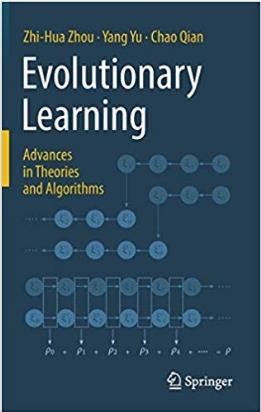Evolutionary Learning: Advances in Theories and Algorithms
豆瓣
演化学习:理论与算法进展
Zhou, Zhi-Hua / Yu, Yang …
简介
Many machine learning tasks involve solving complex optimization problems, such as working on non-differentiable, non-continuous, and non-unique objective functions; in some cases it can prove difficult to even define an explicit objective function. Evolutionary learning applies evolutionary algorithms to address optimization problems in machine learning, and has yielded encouraging outcomes in many applications. However, due to the heuristic nature of evolutionary optimization, most outcomes to date have been empirical and lack theoretical support. This shortcoming has kept evolutionary learning from being well received in the machine learning community, which favors solid theoretical approaches.
Recently there have been considerable efforts to address this issue. This book presents a range of those efforts, divided into four parts. Part I briefly introduces readers to evolutionary learning and provides some preliminaries, while Part II presents general theoretical tools for the analysis of running time and approximation performance in evolutionary algorithms. Based on these general tools, Part III presents a number of theoretical findings on major factors in evolutionary optimization, such as recombination, representation, inaccurate fitness evaluation, and population. In closing, Part IV addresses the development of evolutionary learning algorithms with provable theoretical guarantees for several representative tasks, in which evolutionary learning offers excellent performance.
contents
Table of contents (18 chapters)
Introduction
Zhou, Zhi-Hua (et al.)
Pages 3-10
Preliminaries
Zhou, Zhi-Hua (et al.)
Pages 11-26
Running Time Analysis: Convergence-based Analysis
Zhou, Zhi-Hua (et al.)
Pages 29-39
Running Time Analysis: Switch Analysis
Zhou, Zhi-Hua (et al.)
Pages 41-50
Running Time Analysis: Comparison and Unification
Zhou, Zhi-Hua (et al.)
Pages 51-67
Approximation Analysis: SEIP
Zhou, Zhi-Hua (et al.)
Pages 69-80
Boundary Problems of EAs
Zhou, Zhi-Hua (et al.)
Pages 83-92
Recombination
Zhou, Zhi-Hua (et al.)
Pages 93-108
Representation
Zhou, Zhi-Hua (et al.)
Pages 109-128
Inaccurate Fitness Evaluation
Zhou, Zhi-Hua (et al.)
Pages 129-153
Population
Zhou, Zhi-Hua (et al.)
Pages 155-173
Constrained Optimization
Zhou, Zhi-Hua (et al.)
Pages 175-194
Selective Ensemble
Zhou, Zhi-Hua (et al.)
Pages 197-214
Subset Selection
Zhou, Zhi-Hua (et al.)
Pages 215-231
Subset Selection: k-Submodular Maximization
Zhou, Zhi-Hua (et al.)
Pages 233-254
Subset Selection: Ratio Minimization
Zhou, Zhi-Hua (et al.)
Pages 255-268
Subset Selection: Noise
Zhou, Zhi-Hua (et al.)
Pages 269-283
Subset Selection: Acceleration
Zhou, Zhi-Hua (et al.)
Pages 285-293